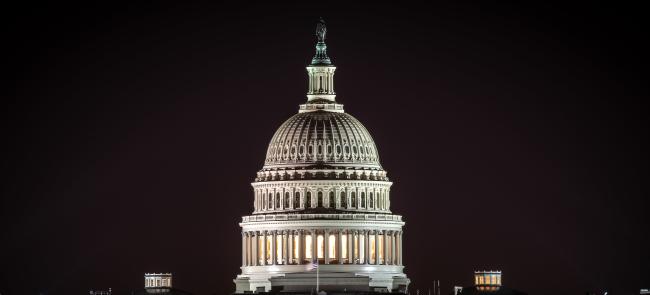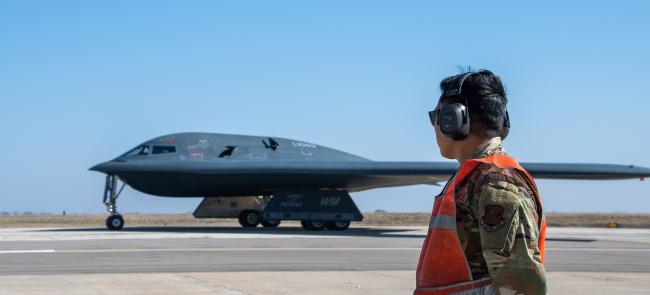
NGAUS, members of Congress and Guard leaders are crying foul over a planned reprogramming that would drain more than $1 billion from critical modernization programs for the Guard.
In all, over $3.8 billion in funds previously authorized for defense programs would be shifted under the plan to instead help pay for a wall on the southern border.
The funds include money previously authorized for the National Guard and Reserve Equipment Account (NGREA), new aircraft and ships, and upgraded Humvees. The reprogramming specifically targeted funds directed by Congress.
On Tuesday, NGAUS called on President Donald Trump to restore the funding in a letter to the president that recalled his remarks at the 138th NGAUS General Conference in 2016, during which then-candidate Trump pledged “to give [the National Guard] the resources, equipment and the support you need and deserve.”
In those remarks, made in Baltimore, Trump promised the Guard a “direct line to the Oval Office.”
The letter, signed by NGAUS chairman Maj. Gen. Michael McGuire and retired Brig. Gen. J. Roy Robinson, NGAUS president, asks for a meeting to discuss the reprogramming.
“Mr. President, you understand better than anyone the critical role played by the National Guard in securing our nation’s borders,” they wrote. “We responded to your call to action and deployed to the southern border utilizing the very same systems and equipment funded by these accounts.”
The reprogramming move has drawn harsh condemnation from Democratic lawmakers and some Republicans. Several military associations, including NGAUS and the Adjutant General Association of the United States (AGAUS), have also expressed worries over the impact of the shifting funds.
“I am greatly concerned that the Department of Defense has decided these funds are not necessary for the safety, readiness and effectiveness of our military, particularly our National Guard and Reserve service members,” said Maj. Gen. Matt Quinn, Montana adjutant general and president of AGAUS. “Our airmen in Montana and elsewhere are flying the oldest model aircraft with technology that no longer meets the demands of our warfighter mission, yet production of newer model aircraft is cut by our DoD. The safety and readiness of our service members must be our first priority.”
NGAUS leaders first spelled out their concerns late last week in letters to Pentagon leaders and key members of Congress. Guard-specific cuts would include $790 million from the Guard in NGREA funding, which is used to modernize or replace old equipment; $100 million from a Humvee modernization program; and $169 million from C-130J Super Hercules procurement.
Each were congressional add-ons intended to purchase unfunded requirements by supporting the modernization of some of the Guard’s oldest equipment.
“The services have historically underfunded the National Guard,” Robinson said. “They have done so more recently knowing that Congress will make up some of the difference. In fact, this gives the services something of an excuse as to why they don’t pay more attention to Guard equipment modernization.
“Any inference that these aren’t critical needs for the Guard is false,” Robinson added. “This is just the Guard being used as a convenient bill-payer.”
On Friday, Defense Secretary Mark Esper defended the decision to divert billions of dollars to the border wall.
“Border security is national security,” he said, “and national security is our mission.”
Esper added, “The action we took is legal under the law, and so it should be no surprise, and I’ll just leave it at that for now.”
But some in Congress believe the move is contrary to Congress’s constitutional authority.
Rep. Mac Thornberry, R-Texas, has been one of the most vocal opponents.
The ranking member of the House Armed Services Committee said Congress arrived at the funding levels it provided after considering the advice of DoD and making independent assessments of risk, threats and other factors. He noted that, under the Constitution, Congress alone has the responsibility to “raise and support armies,” and “to provide and maintain a Navy.”
“Congress has the constitutional responsibility to determine how defense dollars are spent. We take the Pentagon’s recommendations seriously during our deliberations, but the final decisions are contained in the bills passed by Congress and signed into law,” Thornberry said. “Once those choices have been made, the Department of Defense cannot change them in pursuit of their own priorities without the approval of Congress. Attempts to do so undermines the principle of civilian control of the military and is in violation of the separation of powers within the Constitution.”
Thornberry said he supports the border wall but joined other Republicans in their concern that defense funds were paying for the project.
Leaders on the other side of the aisle said the reprogramming shows a desire to fulfill a campaign promise at the expense of national security.
“This administration has already stolen billions from the Department of Defense in order to begin building the President’s vanity wall and today they are doubling down on bad policy,” said Rep. Adam Smith, D-Wash., and chairman of the House Armed Services Committee. “The President loves to take credit for ‘rebuilding’ the military, but today’s reprogramming decision does the exact opposite.”











